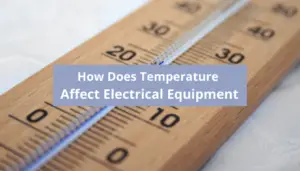Motors are an essential component of many modern-day appliances, industrial machinery, and automotive systems.
These machines work by converting electrical energy into mechanical energy, making them crucial to the operation of many systems.
However, one issue that can damage motors is overvoltage. Overvoltage is a condition in which the voltage supplied to a motor exceeds its rated voltage.
In this article, we will explore the effects of overvoltage on motors, how to identify overvoltage damage, and ways to prevent overvoltage damage from occurring.
Table of Contents
How Overvoltage Can Damage Motors
Overvoltage can damage motors in several ways. The first and most apparent effect of overvoltage on motors is overheating.
When the voltage supplied to a motor exceeds its rated voltage, it causes the motor to generate more heat than it should. Overheating can cause significant damage to a motor, leading to its eventual failure.
Another way that overvoltage can damage motors is by causing mechanical stress.
When the voltage supplied to a motor is too high, it can cause the motor’s components to work harder than they should, leading to premature wear and tear. This can cause the motor to fail prematurely.
In addition to overheating and mechanical stress, overvoltage can also damage a motor’s insulation.
The insulation in a motor serves as a protective barrier between the motor’s windings and the motor’s housing.
When the voltage supplied to a motor is too high, it can cause the insulation to break down, leading to short circuits and electrical failures.
Overvoltage can also cause other symptoms in motors, including noisy operation, vibrations, loss of power, and burnt or melted insulation.
Symptoms of Overvoltage Damage in Motors
To identify overvoltage damage in motors, it is essential to know the symptoms that can occur. Noisy operation is one of the most common symptoms of overvoltage damage in motors.
This noise can be caused by the excessive heat generated by the motor due to overvoltage, leading to the motor’s components vibrating and making noise.
Another symptom of overvoltage damage in motors is vibrations. Vibrations can be caused by the mechanical stress placed on the motor’s components due to overvoltage.
Loss of power is another common symptom of overvoltage damage in motors, as the excessive heat generated by the motor can cause the motor to lose power over time.
Finally, burnt or melted insulation can occur in motors that have suffered overvoltage damage, leading to short circuits and electrical failures.
Factors Affecting Overvoltage Damage to Motors
Several factors can affect the extent of overvoltage damage to motors. The magnitude of overvoltage is one such factor.
The higher the voltage supplied to a motor above its rated voltage, the more significant the damage is likely to be. Another factor is the duration of overvoltage.
The longer the motor is subjected to overvoltage, the more damage it is likely to sustain. The frequency of overvoltage is also a factor, as motors subjected to frequent overvoltage are more likely to suffer damage than those subjected to occasional overvoltage.
Finally, motor load and operation conditions can affect the extent of overvoltage damage, as motors under heavy loads or operating in extreme conditions are more likely to suffer damage from overvoltage.
Prevention of Overvoltage Damage to Motors
Preventing overvoltage damage to motors is essential to ensure their proper operation and longevity.
One way to prevent overvoltage damage is to use voltage regulators and surge protectors. These devices are designed to regulate voltage and protect motors from voltage spikes and surges.
Regular maintenance and inspection of motors can also help prevent overvoltage damage. Regular maintenance, such as cleaning, lubrication, and inspection of components, can help identify any potential issues and prevent overvoltage damage from occurring.
Proper installation and wiring of motors are also crucial, as incorrect wiring can lead to overvoltage damage.
In addition to these preventive measures, it is also essential to educate operators and users on the proper use of motors.
Users should be informed of the voltage ratings of the motors and cautioned against using them beyond their rated voltage.
They should also be trained to identify the symptoms of overvoltage damage and instructed to report any issues immediately to prevent further damage.
Conclusion
| Type of Damage | Description |
|---|---|
| Insulation Failure | Overvoltage can cause the insulation in the motor to break down, leading to short circuits and potentially catastrophic failure. |
| Bearing Damage | High voltage can lead to arcing and sparking, which can damage bearings and cause premature failure. |
| Overheating | Overvoltage can cause excessive heat buildup in the motor, leading to melting or warping of components and reduced efficiency. |
| Reduced Lifespan | Motors subjected to overvoltage will typically have a reduced lifespan and require more frequent repairs and replacements. |
| Safety Risks | Overvoltage can pose a significant safety risk to operators and nearby equipment, potentially leading to fires or explosions. |
Overvoltage can cause significant damage to motors, leading to premature failure and costly repairs.
However, by understanding the effects of overvoltage, identifying the symptoms of the damage, and taking preventive measures, overvoltage damage to motors can be prevented.
Using voltage regulators and surge protectors, regular maintenance and inspection, proper installation and wiring, and educating users are all critical steps in preventing overvoltage damage to motors.
By taking these steps, we can ensure the proper operation and longevity of motors and avoid costly repairs and downtime.
Don’t Leave Empty-Handed!
Install my Free Android App on Google Play:
Electrical Cables Most Common Tables “Cables Tables”
And, my Electrical Calculations App “Fast Electrical Calculator”
Discover more great content by subscribing to My channel
Looking to stay ahead of the game in the world of electrical engineering? Subscribe to my YouTube channel and gain access to exclusive content you won’t find anywhere else!
The staff I recommend
(Amazon Affiliate Links to products I believe are high quality):
- Economy 120 Volt/60Hz AC Power Source – Step-Down Voltage & Frequency Converters 1800W
- UNI-T Digital Multimeter Tester UT139C
- 50-Amp Extension Cord for RV “100ft”
- Voltage Stabilizer 110/220v
- Hair Dryer “best selling“
- TOSHIBA EM131A5C-BS Countertop Microwave Ovens
Disclaimer: This contains affiliate links to Amazon products. I may earn a commission for purchases made through these links.


